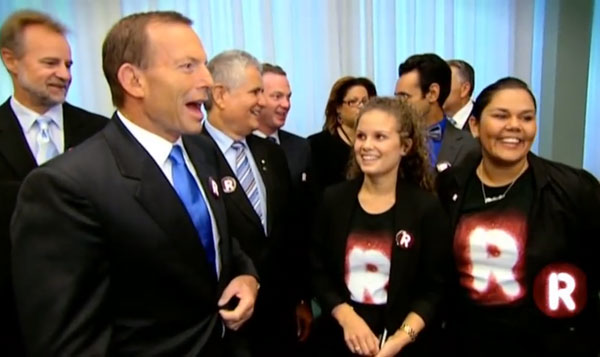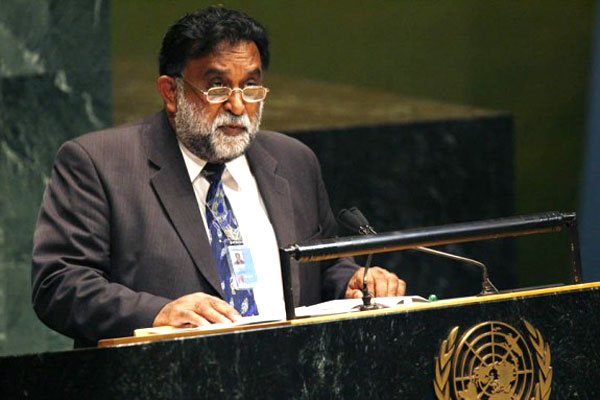Two years ago, Aboriginal and Torres Strait Islander people from all around the country blacked out the halls of Parliament, coming together to celebrate what some claimed was a piece of “rare bipartisanship” by both major parties on the issue of constitutional reform.
On this occasion, it was the Aboriginal and Torres Strait Islanders Recognition Act, commonly referred to as the “Act of Recognition”, a bill introduced and supported unanimously by all sides of politics.
In the absence of any proposed model to take to a referendum, the bill formally recognised Indigenous peoples as the first inhabitants of this nation and committed Parliament to setting a date for a referendum within two years.
Some First Nations people posed for happy photos alongside politicians, all high on the possibility of renewed “momentum” on an issue that has been the prevailing narrative in Aboriginal affairs for almost a decade, drowning out voices for sovereignty and treaty, while at the same time stumbling along with on-gain off-again bursts of enthusiasm by the broader public.

By 2015, when the Act’s sunset clause was up, the big politicians said we would have a date. There would be renewed momentum for this government-backed, but somehow ‘grassroots’, movement.
While the government-funded Recognise campaign hailed the passage of the legislation as “historic”, the reality was, it was a broken promise – a bill designed to buy time as both major parties continued to drag their feet.
Even now, there has been no official response by either Labor or the Coalition on the recommendations of the expert panel, which after an extensive series of community consultations, delivered its report to Prime Minister Julia Gillard in 2011.
The co-leader of Recognise Tim Gartrell labelled the Act of Recognition a “down-payment”.
But last week, Indigenous affairs minister Nigel Scullion confirmed the government had already defaulted.
In a statement largely ignored by the media and wider public, Senator Scullion announced he was introducing a bill that would extend the Act of Recognition for three years.
Two years from the passage of the act, from the happy snaps of blackfellas and politicians united in their determination to ‘right an historical wrong’, there is no mention of a concrete date for a referendum.
In its place is ‘Prime Minister for Aboriginal Affairs’ Tony Abbott’s hope that a referendum would be held in 2017, on the same date as the most successful referendum in Australia’s history – the 1967 vote, where the vast majority of Australians agreed Aboriginal people should be counted in the Census.
It’s yet another broken promise in a sea of broken promises, and gives weight to the growing tide of Aboriginal anger that says constitutional reform is simply a distraction from the real issues that are eating communities from the inside – issues like the rising numbers of Aboriginal children placed in out-of-home-care; the staggering black jailing rates that lead to black deaths in custody; the failures to protect country; destruction of priceless culture and heritage; and assaults on land rights all around the country.
And at the heart of it, they feel a great cloak has been put over sovereignty and treaty, which has been rendered almost invisible in the waves of positive coverage for Recognise.
In the midst of the black spot on a proposed model, which constitutional law experts like Professor Megan Davis argue must come first before arguments on setting a date, there are small cracks in which this anger is finally seeping through to public consciousness.
For the past year, a joint parliamentary committee headed by the only two Aboriginal people in Parliament – Hasluck MP Ken Wyatt and Northern Territory Senator Nova Peris – has been conducting hearings and taking submissions into the way forward for constitutional reform.
At a hearing in Sydney, Australia’s only nationally elected Aboriginal body – the National Congress of Australia’s First Peoples acknowledged that the growing opposition in Aboriginal communities has meant there are many who will vote ‘no’ at a referendum, regardless of the question.
Co-chair Les Mazeler said he could not support people voting no for the sake of voting no, but that there was cynicism in the Aboriginal community about governments supporting constitutional recognition, whilst impinging on Aboriginal rights across the country.
“It is clear that the sentiment is there,” Mr Malezer told the inquiry.

“Of course we cannot accept, as I am sure you cannot accept, the fact that someone says: “Well, I don’t care what it says, I’m just going to vote against it. I’ve had enough’.
“And you sort of look at people in surprise because people are saying ‘We are taking hits here’. So why do we believe that on one hand we are being offered sugar and on the other hand we are being hit? We are not going to play that game. It is an ad-hoc comment but as I said, I suspect that you, or some of you, may have also received this sort of feedback in the process.”
I have seen some supporters of constitutional reform try and argue that blackfellas who oppose Recognise do not fully understand what or why they are opposing it. I have heard others claim that the voices of opposition are in the minority.
Both arguments are unjustified – anecdotally, I have met very few Aboriginal people who are supportive of the campaign and who aren’t connected in some way to the Recognise movement. The overwhelming response has been one of cynicism.
And the people who oppose it often have very good reasons for doing so. You may think that’s an unscientific way to judge public opinion, but I would counter it is just as scientific as Recognise’s own polls and regional forums, stacked with supporters.
You only have to look at the history of the movement, from the failure to respond to the expert panel, from the expert panel’s own refusal to acknowledge sovereignty in its recommendations because it was unlikely to pass at referendum, to the farcical Act of Recognition which binds Parliaments to nothing, right through to Ken Wyatt’s comments in the Australian yesterday.
Mr Wyatt told The Australian that one of the key recommendations of the expert panel – the proposed section 116A, which would replace the controversial section 51 ‘Race Powers’ with a clause preventing governments passing laws on the basis of race – would be labelled “problematic” in his inquiry’s report.
The Australian reported it signalled the death of the non-discrimination clause.
“That advice that we have received from constitutional lawyers and from the Attorney-General is that you are effectively creating a quasi-bill of rights within the constitution,” he told the Australian.
“In the legal profession and certainly from the Attorney General that we have had private discussions with, there was no appetite to support it. What was put to us was there would be strong opposition from state attorney-generals on this one.”
There are several peak bodies – like the NSW Aboriginal Land Council – who have argued that constitutional reform would be meaningless if it was limited to fluffy recognition in the preamble, and that the removal of the race power, and provisions to protect against discrimination, is paramount.
Mr Wyatt said instead a better solution would be to strengthen the Racial Discrimination Act.
But the RDA can easily be suspended, and in fact, has on three separate occasions – all three times in order to discriminate against Aboriginal people.
The most recent case – the Northern Territory intervention – led to a more than quadrupling in attempt suicide and self-harm rates, and a feeling of disempowerment across the communities it affected. The Rudd government managed to reinstate the RDA, whilst still keeping in place the most discriminatory measures of the legislation.
In its submission to the inquiry, the Aboriginal Peak Organisations of the NT said that constitutional protection against racial discrimination was crucial in order to sufficiently protect against racially discriminatory laws.
“The Constitution needs to explicitly preclude racial discrimination. A provision should be inserted in the Constitution which provides that no Commonwealth, State or Territory law or government action can discriminate on the basis of race,” it said.
But the expert panel’s section 116A did not go far enough, the organisations said, and it is likely the NT intervention could still have been rolled out even if there was the proposed provision in the constitution.
“Using the (Northern Territory National Emergency Response… which was explicitly and unashamedly discriminatory) as a litmus test, the NTNER would arguably be permissible under the Expert Panel’s proposed section 116A non discrimination provision as the government has consistently maintained that the NTNER was ‘for the purpose of overcoming disadvantage.
“We therefore urge the Committee to consider a stronger non-discrimination provision than that recommended by the Expert Panel.”
The fact the first Aboriginal federal MP could consider instead watering down a recommendation in order to appease state attorney generals, at the expense of recommending a constitutional protection against racial discrimination directed at the nation’s most vulnerable, should tell you all you need to know about why Aboriginal people are angered by this process.
The head of Australians for Native Title and Reconciliation (ANTAR) Andrew Meehan was questioned repeatedly by the inquiry in Sydney about whether he supported a proposed model put forth by Cape York lawyer Noel Pearson in order to counter conservative opposition to constitutional recognition.
But the questions about how to garner Aboriginal and Torres Strait Islander support was relegated to the background. It was instead largely focused on bringing white racists to the table.
“It is an issue. I think that there will be a 'no' case, whatever proposal is put forward. I do not think there is any hiding from that. The strongest point that I would make is that Aboriginal people and Torres Strait Islander people have put forward a view. I get back to the point I made before: it would be perverse to go forward with something that really did not have that support. That is a prerequisite,” Mr Meehan said.
Righting historical wrongs will not occur through a process that has fundamentally refused to honour the depth of feeling within Aboriginal communities. It has also failed to acknowledge the division these debates have caused in communities already ruptured by the consequences of 227 years of dispossession.
The lack of voice around key Aboriginal aspirations has a significant impact on Indigenous health and wellbeing.
There are still calls for treaty and sovereignty. They are not white noise.
First Nations people do not have time to waste on “Acts of Recognition” which tick a box for big politicians. We do not have time to spend on inquiries that ignore our justifiable concerns at a process that has largely excluded us. As the sun sets on any substantive change to the constitution, there is an urgency that says time is running out for pushing land rights, sovereignty and treaty.
As one of our young Aboriginal up-and-coming lawyers Jason O’Neill wrote in the Indigenous Law Bulletin last month: “It is likely that the constitutional recognition process, if successful, will have very little if any substantive impact upon the daily lives of Indigenous people or the systematic issues they face.
“Regardless of any good intentions of reconciliation and recognition behind the Recognise campaign, the continued expense of a ‘top-down’ symbolic campaign, in the face of systematically ineffective Indigenous expenditure and a failure of the settler colonial state to address Indigenous disadvantage, shows that the Recognise campaign may not be for Indigenous Australians after all.”
And if the campaign does not have the overwhelming support of Aboriginal and Torres Strait Islander people, what point is there to it at all?
Donate To New Matilda
New Matilda is a small, independent media outlet. We survive through reader contributions, and never losing a lawsuit. If you got something from this article, giving something back helps us to continue speaking truth to power. Every little bit counts.



